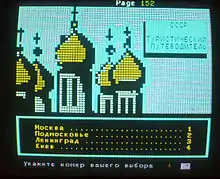NBC Teletext
NBC Teletext was a teletext service provided by the American TV network NBC from 1981 to 1985, based on the NABTS standard.[1][2][3][4]
| Developer | NBC |
|---|---|
| Type | Teletext |
| Launch date | 1983 |
| Discontinued | 1985 |
| Platform(s) | NABTS |
| Status | Discontinued |
Initial trials started in Los Angeles in 1981.[5] Transmissions started as a regular service on May 16, 1983[6] after FCC approval,[7][8][9] in parallel with CBS similar ExtraVision[10] service.
Initially, the NBC Teletext was composed of a 50-page magazine, with the index page listing the following topics: Newsfront, Weather, Sports, Money, People, Your Body, Living, Your Stars, On the Soaps, Fun & Games, Kid's Korner, Partners, Credits.[9] Graphics were reasonably detailed, allowing a detailed rendition of weather maps or movie posters.[9]
Since teletext provides real-time updates, it was expected that the service would attract advertisers like airlines, stores or businesses interested in constantly updating their rates and schedules.[11] As there were no available standalone consumer decoders on the market, it was hoped that by launching the system manufacturers would soon built teletext capability into all television sets.[6][11]
Demonstrations of the system were performed at the 1983 National Association of Broadcasters convention in Las Vegas, the Organization of Iberian-American Broadcasters (OTI) in Mexico City, and the International Television Symposium and Technical Exhibition in Montreux.[12][1][13] Special content was developed for these demonstrations.
In 1984 projections, NBC expected the teletext service to be profitable by 1987 and reach 10 percent of US homes by 1990.[11]
These expectations were not met, and the system was shut down in January 1985.[14][15]
References
- "Portfolio 1981-89: Teletext". The Communication Studio. Retrieved 2022-12-15.
- Ellers, Ed. "TELETEXT GALLERY - TELETEXT AROUND THE WORLD - UNITED STATES OF AMERICA". The Teletext Museum. Retrieved 2022-12-15.
- Graziplene, Leonard R. (2000). Teletext: Its Promise and Demise. Lehigh University Press. ISBN 978-0-934223-64-5.
- Technology, United States Congress House Committee on Science and Technology Subcommittee on Science, Research, and (1984). Developing Technologies for Television Captioning: Benefits for the Hearing Impaired : Hearing Before the Subcommittee on Science, Research, and Technology of the Committee on Science and Technology, U.S. House of Representatives, Ninety-eighth Congress, First Session, November 9, 1983. U.S. Government Printing Office.
{{cite book}}: CS1 maint: multiple names: authors list (link) - Gingras, Richard. "Broadcast Teletext, 1980". www.richardgingras.com. Retrieved 2022-12-15.
- Watson, Barbara (September 1983). "NBC offers teletext" (PDF). RCA Engineer. p. 18.
- Renner-Smith, Susan (September 1984). "Teletext decoder for network-TV "magazine"". Popular Science. p. 40.
- Hoard, Bruce (April 25, 1983). "FCC Authorizes Teletext Broadcasting". Computerworld. p. 71.
- Astle, B. (September 1983). "Teletext standards in North America" (PDF). RCA Engineer. pp. 15–25.
- Carlson, David (2009). "ExtraVision". David Carlson's Virtual World. Retrieved 2022-12-15.
- SHAW, SYDNEY (May 2, 1984). "Teletext, a new service that displays 'pages' of information..." United Press International, Inc.
- Vaughan, John (2019-01-13). "TV In-Channel Magazine NBC Teletext". John Vaughan - my Portfolio. Retrieved 2022-12-16.
- Dixon, Douglas (July 1989). "Life before the chips: simulating digital video interactive technology". Communications of the ACM. 32 (7): 824–831. doi:10.1145/65445.65449. ISSN 0001-0782. S2CID 17999029.
- Gillies, Donald (1989). Technological Determinism In Canadian Telecommunications: Telidon Technology, Industry and Government. Ryerson Polytechnical Institute. p. 6. doi:10.22230/cjc.1990v15n2a549 (inactive 1 August 2023).
{{cite book}}: CS1 maint: DOI inactive as of August 2023 (link) - Downey, Gregory J. (2008-02-25). Closed Captioning: Subtitling, Stenography, and the Digital Convergence of Text with Television. JHU Press. p. 224. ISBN 978-0-8018-8710-9.
